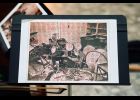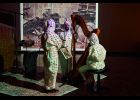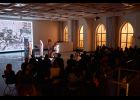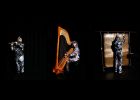A Foray into the Worlds of Imaginary Animals and Humans
This essay places Flusser’s What if? (2022) and his experiments with Louis Bec’s Institut Scientifique de Recherche Paranaturaliste (Scientific Institute of Paranaturalist Research – I.S.R.P.), in conver-sation with Joan Fontcuberta’s Fauna exhibit (1985-89). It understands both Flusser’s and Fontcuberta’s experiments as being line with the modernist obsession with fake sciences, especially the pataphysical work of Alfred Jarry. The essay argues that the strangeness in Flusser’s What if? comes from a particular form of reversing the focus of scientific investigation, forcing readers to look inward to the role of scientific writing, and the scientist, and their role in framing the truths they claim to find.
“We shall be your favorite disappearing act!” / Clare Strand, Playing a Photograph
This essay discusses the intellectual foundation of the research group Thinking Tools at the Royal Academy of Antwerp. Established within the photography department at the Academy, the research group quickly decided to mainly support research into experimental photographic practices that radically question existing presuppositions. It starts from André Bazin's contention photography is the only way we can enjoy the absence of the human hand in the production of an image and goes on to explore how this theme of absence has become a guiding principle for the research group. The writings of Vilém Flusser on photography introduced us to the concept of the apparatus and to the photographer as an operator. These allow us to critically rethink the idea of photography as a simple instrument of image making. For a better understanding of the sovereignty of the camera we turned another thinker inspired by Flusser, the French photohistorian Michel Frizot. His definition of photography as the conjunction of an optical and a chemical system helped us to grasp in more concrete terms how photography radically differs from other existing art forms. Combining the theoretical positions of Flusser and Frizot gave us a robust framework for the 2021 publication Off Camera which set out to demonstrate how the concept of ‘the photographic’ expanded into the larger realm of the visual arts. The essay concludes with a discussion of two artists whose work could illuminate how this concept of ‘the photographic’ is at play in contemporary art.
Clare Strand’s “Playing a Photograph” is a telematic dialogue between a photograph and musical performers from the Royal Conservatoire (https://vimeo.com/773269239/c934f6a17a).




